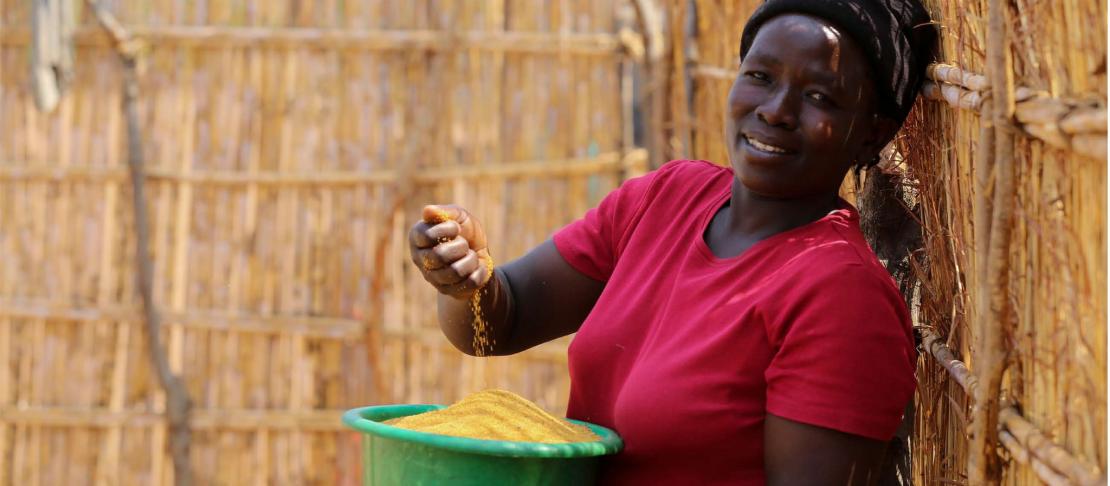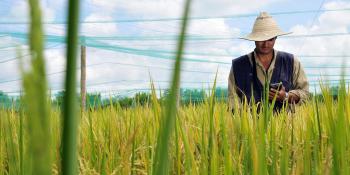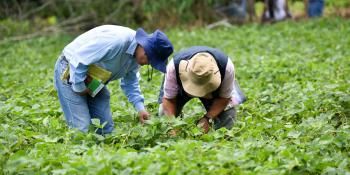Why are some farmers more food secure than others?

What climate adaptation strategies can both men and women farmers adapt for a more food secure future?
East Africa is hard hit by climate-related impacts. Farmers are suffering from increasing erratic rainfall, droughts combined with flash floods and hotter temperatures. Projections are not painting a rosy picture either, as recent findings model fewer suitable areas to grow maize, common beans and finger millet in particularly West and East Africa.
How well people will be able to adapt to climate change, or mitigate related effects, will depend on whether they are able to change their behaviour and adopt improved agricultural technologies and management strategies. But question is, which climate-adaptive strategies can both men and women farmers adopt which will also secure food year round?
A study, led by researchers based at the International Livestock Research Institute (ILRI) and CGIAR Research Program on Climate Change, Agriculture and Food Security (CCAFS), decided to look at what contributes to food security within a household and what others can learn from these families. The team also wanted to explore whether there are gender differentiated responses to climate change.
Collecting this data is important, as there are still knowledge gaps around which farm-related adaptation options work in which contexts. As well as, how different farm strategies and techniques can be successfully implemented by both both men- and women-headed households to reduce food insecurity.
Incorporating a gender-component is key as female-headed households are on the increase in Sub-Saharan Africa and face a differing reality than male-headed families. Households led by women are believed to be disadvantaged in terms of access to land, livestock, other assets, credit, education, health care and extension services. Thus, finding technologies and practices that both men and women can successfully adopt, given certain financial- and sociocultural barriers, are key.
To better understand food systems and farmers’ adaptation measures, the study used a unique dataset of 600 households to explore different aspects of food security and varied performance between female-headed and male-headed household.
The study also assesses livelihoods options and strategies and how these in turn influence food security. The analysis is based on a very detailed farm characterisation survey carried out in three sites in Kenya, Uganda and Tanzania.
The survey was undertaken using data collected through IMPACTLite. IMPACTLite is an in-depth household survey tool, which can help researchers see the big picture and collect key information around farming systems, for example if and how farmers are adapting agriculture practices, in a standardized format. The tool provides data that is in-depth and quantitative with a built in component for gender-disaggregated analysis.
Scientists from ILRI and CCAFS have through IMPACTLite collected data from 2,500 households in 13 sites in South Asia and East and West Africa.
The results from this comprehensive analysis indicate that farmers who are more food secure are also the ones to diversify the most.
They have a variety of crops and livestock as well as alternative income-generating activities taking place on their farms. These food secure farmers are also very “market oriented”, i.e. focused on being present and engaged on the market to sell their produce.
The study also found that men and women farmers tend to pursue different livelihood portfolios, i.e. what is grown and produced on the farm.
Here women were less likely to grow high-value crops than men, and have a less diversified crop portfolio.
A less diversified portfolio could spell trouble for these households, as diversification seems to be number one indicator for a year-round food supply.
Other key indicators for food security relate to equal information and knowledge access and sharing. Communicating new technologies and practices in innovative ways, targeting especially female-headed households, is key in order for farmers to learn and take on new climate-smart agriculture technologies.
Identifying actions and strategies that contribute to food security for both female- as well as male-headed households are key to generate more equal and better-targeted climate- and food system policies and generate a sustainable change among smallholder systems in East Africa.
This study will be presented further at the Our Common Future Under Climate Change conference from July 6-10 in Paris. Follow @cgiarclimate and #AgCOP21 on Twitter for live updates from the conference. Read blogs of the conference sessions at ccafs.cgiar.org/blogs/CFCC15
Study will be released later this year. Stay tuned on our blog!
Silvia Silvestri is a Senior scientist at ILRI. Cecilia Schubert is the Communications Officer for CCAFS Flagship 4.



